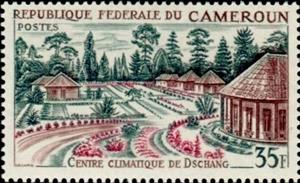Stamp: Dschang Health Resort (Cameroun 1966)
Dschang Health Resort (Cameroun 1966)
04 June (Cameroun ) within release Cameroun Hotels (II) goes into circulation Stamp Dschang Health Resort face value 35 Central African CFA franc
| Stamp Dschang Health Resort in catalogues | |
|---|---|
| Michel: | Mi:CM 469 |
| Stamp Number: | Sn:CM 434 |
| Yvert et Tellier: | Yt:CM 419 |
Stamp is horizontal format.
Also in the issue Cameroun Hotels (II):
- Stamp - Dschang Health Resort face value 35;
- Stamp - Hotel Terminus Yaoundé face value 50;
- Stamp - Hotel Imperial Yaoundé face value 60;
- Stamp - Hotel Independance Yaoundé face value 85;
- Stamp - Mora Hunting Camp face value 100;
- Stamp - Boukarous-camp of Waza face value 150;
Stamp Dschang Health Resort it reflects the thematic directions:
Tourism is travel for pleasure or business; also the theory and practice of touring, the business of attracting, accommodating, and entertaining tourists, and the business of operating tours. Tourism may be international, or within the traveller's country. The World Tourism Organization defines tourism more generally, in terms which go "beyond the common perception of tourism as being limited to holiday activity only", as people "traveling to and staying in places outside their usual environment for not more than one consecutive year for leisure, business and other purposes". Tourism can be domestic or international, and international tourism has both incoming and outgoing implications on a country's balance of payments. Today, tourism is a major source of income for many countries, and affects the economy of both the source and host countries, in some cases being of vital importance.
A hotel is an establishment that provides paid lodging on a short-term basis. Facilities provided inside a hotel room may range from a modest-quality mattress in a small room to large suites with bigger, higher-quality beds, a dresser, a refrigerator, and other kitchen facilities, upholstered chairs, a flat-screen television, and en-suite bathrooms. Small, lower-priced hotels may offer only the most basic guest services and facilities. Larger, higher-priced hotels may provide additional guest facilities such as a swimming pool, a business center with computers, printers, and other office equipment, childcare, conference and event facilities, tennis or basketball courts, gymnasium, restaurants, day spa, and social function services. Hotel rooms are usually numbered (or named in some smaller hotels and B&Bs) to allow guests to identify their room. Some boutique, high-end hotels have custom decorated rooms. Some hotels offer meals as part of a room and board arrangement. In Japan, capsule hotels provide a tiny room suitable only for sleeping and shared bathroom facilities.


